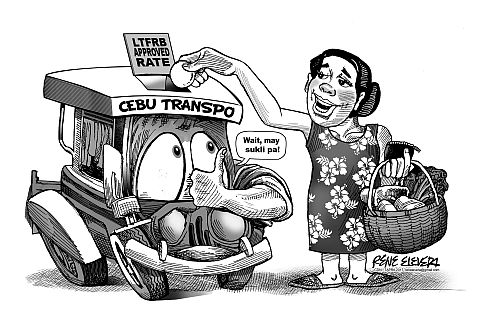
When all is said and done, Metro Cebu’s transport groups and the government’s transport agencies should prioritize and consider as paramount public interest and welfare in resolving the fare rate increase petition issue.
Last Wednesday’s public hearing on the fare rate increase petition held by the Land Transportation Franchising and Regulatory Board (LTFRB) at the Cebu Normal University ended with Metro Cebu’s biggest transport group, the Cebu Integrated Transport Service Cooperative (Citrasco), dropping its fare rate surge proposal and opting for a P1 to P1.50 fare rate increase instead.
Other transport groups were much more demanding. The Basak Lapu-Lapu City Jeepney Operators and Drivers Association Inc. (Balacjoda) demanded an P8 minimum fare and an additional P1.50 for peak hours, while the militant leftist transport group Pagkakaisa ng Samahan ng mga Tsuper at Opereytor Nationwide (Piston) wanted a uniform fare rate increase across the country.
While it is the LTFRB central office in Manila that will decide the eventual fare rate to be imposed on Metro Cebu’s commuters, Citrasco’s proposal appears to be the most direct and most tolerable among the three.
Balacjoda’s petition was rightfully dismissed by the LTFRB not only for their failure to comply with requirements but also for their utter disregard and contempt for the commuters as they appear to want to have their cake and eat it too.
They have yet to present any adequate evidence that would justify their demand and prove beyond reasonable doubt that the traffic congestion experienced in their areas had grossly affected their earnings.
What is most objectionable about the fare rate increase petitions of these groups is the inclusion of the so-called fare rate surge scheme that is being implemented by transport network service firms like Uber and Grab.
The few commuters who attended the hearing were on point when they said that the fare rate surge increase of P1.50 was open to manipulation even if the passenger jeepneys were issued fare matrices which can be manipulated unless sealed by the LTFRB.
Since jeepney operators are loath to pay extra for a fare matrix, they would rather compel the public to trust on the “better judgment” of the drivers to charge fares as they see fit.
As a lot of commuters know by now to their chagrin, drivers and their dispatchers conveniently forget to give a 50-centavo change to commuters who pay P7 for the current P6.50 minimum fare rate and even demand that commuters give the exact change, placing the burden and inconvenience squarely on the riding public.
While operators and drivers need to earn, they must to be repeatedly and constantly reminded about the financial straits of their customers to whom they rely on for their living and not pass the burden of fuel rates and other expenses onto their shoulders.